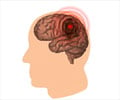Researchers at Saint Louis University have identified a new way of getting a promising treatment for Alzheimer's disease and stroke.
Researchers at Saint Louis University have identified a new way of getting a promising treatment for Alzheimer's disease and stroke.
"We found a unique approach for delivering drugs to the brain. We're turning off the guardian that's keeping the drugs out of the brain," said William A. Banks, M.D., professor of geriatrics and pharmacological and physiological science at Saint Louis University.The brain is protected by the blood-brain barrier (BBB), a gate-keeping system of cells that lets in nutrients and keeps out foreign substances.
BBB passes no judgment on which foreign substances are trying to get into the brain to treat diseases and which are trying to do harm, so it blocks them without discrimination.
"Our new research shows a way of getting a promising treatment for these types of devastating diseases to where they need to be to work," said Banks, who also is a staff physician at Veterans Affairs Medical Center in St. Louis.
The therapy, known as PACAP27, is a hormone produced by the body that is a general neuro-protectant. PACAP stands for pituitary adenylate cyclase-activating polypeptide.
He compared a specific guarding mechanism in the BBB - efflux pumps - to bouncers at exclusive nightclubs. While they welcome those on the approved guest list, they look for troublemakers trying to crash the party, refuse to let them in and evict them if they do get in.
Advertisement
"We went after the guard and essentially told him to go on break for a while so PACAP27 could get into the brain," Banks said.
Advertisement
"We reversed the symptoms of the illnesses. The mice that had a version of Alzheimer's disease became smarter and in the stroke model, we reduced the amount of damage caused by the blockage of blood to the brain and improved brain recovery," Banks said.
The study is published in the Nov. 12 early online issue of the Journal of Cerebral Blood Flow and Metabolism.
Source-ANI
SRM















